By AFP

Mayotte's shantytowns never stood a chance against the cyclone - Copyright AFP MIGUEL MEDINA
Simon AVON
The dismal quality of housing across Mayotte has compounded the devastating impact of Cyclone Chido on the poverty-stricken French Indian Ocean territory where hundreds, or maybe thousands, are feared dead.
Before the storm hit, around a third of the island’s population was living in iron-sheeted huts that never stood a chance against the powerful cyclone.
By the time it was gone, all of Mayotte’s shantytowns were flattened, burying lives — and livelihoods — beneath them.
“We fear there will be a considerable number of deaths,” a French government official told AFP. “Several hundred, or maybe several thousand.”
Mayotte is the poorest part of France, of which it is an integral part.
Recent official data on the state of housing in Mayotte are hard to come by but 2017 data published by the national statistics institute said 40 percent of the island’s homes are built with metal sheets and around a third have no access to running water.
– Flimsy –
“They’re made of wood, corrugated iron, and situated on hills, on beaten earth,” said Florent Vallee, who runs the French Red Cross branch’s emergency operations.
“You can easily imagine the wind barrelling into them, and the rain creating mudslides.”
Over the decades, French authorities have tried to improve housing conditions for the island’s population which numbers 320,000 according to official data, but is in fact much greater because of an influx of undocumented migrants who do not show up in government statistics.
As recently as the late 1970s, modern building materials were virtually unknown in Mayotte, said Megane Aussedat, a sociologist and expert on informal housing on the island.
Despite government programmes to replace precarious shelters with solid housing, the number of available homes is still inadequate compared to the size of the population, and the migration influx.
They are also out of reach for many people in Mayotte where the median monthly income is 260 euros ($273), compared with around 2,600 euros pretax on the French mainland.
Subsidised housing projects have also been slow to materialise, said Aussedat.
However, since 2018 the authorities have been allowed to raze substandard housing provided they immediately offered inhabitants new homes.
Such clearing operations, involving massive police contingents, are sometimes thought to have the secondary objective of flushing out undocumented migrants, but Aussedat observed that telling illegals from legals can be a challenge.
“There is almost no family in Mayotte,” she said, “where everybody’s status is either documented or undocumented”.
– Comoros influx –
Mayotte’s immigration issue is almost entirely due to an influx from the Comoros, an archipelago whose closest shores are just 70 kilometres (44 miles) from Mayotte, and that declared independence in the 1970s while Mayotte opted to remain French.
As poor as Mayotte is by French standards, the Comoros are even poorer, tempting many there into a perilous journey across the water in search of a better life in Mayotte.
They often end up living in makeshift areas consisting mostly of so-called “bangas” — small houses made of cloth and thatch.
When Chido hit, many refused to leave their homes, taking their chances with the cyclone rather than face the danger of their homes being looted or of being picked up by the authorities.
Vallee said emergency services had rescued “entire families, and also a lot of children who were left alone”.
Sanitary conditions, already precarious, have worsened since, mostly because of patchy access to clean water that could prompt another cholera outbreak like the one in the spring of 2024 that killed seven people, said Jean-Francois Coty, president of the Medecins du Monde NGO.
– ‘Brakes on healthcare access’ –
Undocumented migrants’ “fear of moving is putting the brakes on healthcare access”, he said.
A French government scheme allowing undocumented people access to state healthcare is not available in Mayotte.
Coty said he hoped that French officials will pause forced deportations so immigrants can seek help without fear of expulsion.
“This is a time for humanitarian aid, not for a crackdown,” he said.
"You feel like you are in the aftermath of a nuclear war," said one resident. "I saw an entire neighborhood disappear."
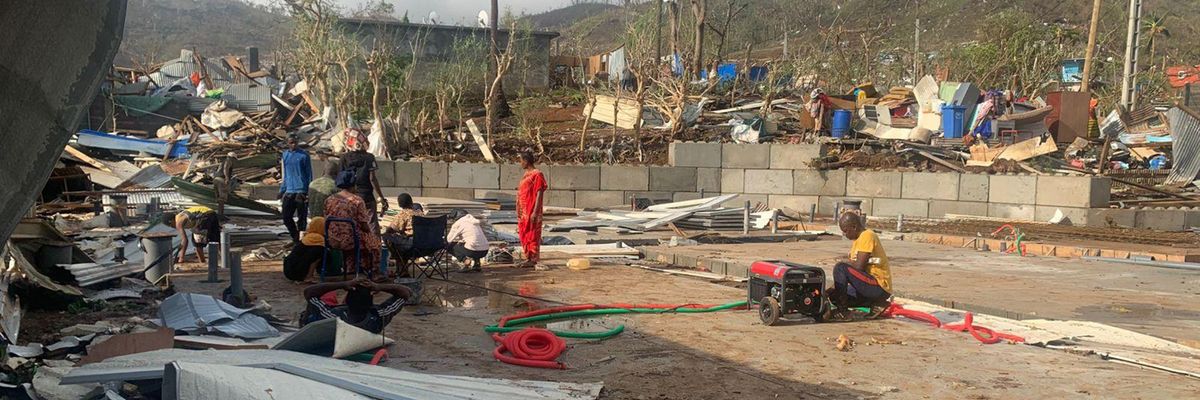
A photo taken on December 15, 2024 shows residents sitting among piles of debris of metal sheets and wood after homes were destroyed by the cyclone Chido that hit France's Indian Ocean territory of Mayotte.
(Photo: Kwezi/AFP via Getty Images)
Julia Conley
Dec 16, 2024
COMMON DREAMS
Undocumented migrants living in informal settlements in the French territory of Mayotte were among those whose lives and livelihoods were most devastated by Cyclone Chido, a tropical cyclone that slammed into the impoverished group of islands in the Indian Ocean over the weekend.
Authorities reported a death toll of at least 20 on Monday, but the territory's prefect, François-Xavier Bieuville, told a local news station that the widespread devastation indicated there were likely "some several hundred dead."
"Maybe we'll get close to a thousand," said Bieuville. "Even thousands... given the violence of this event."
Mayotte, which includes two densely populated main islands, Grande-Terre and Petite-Terre, as well as smaller islands with few residents, is home to about 300,000 people.
The territory is one of the European Union's poorest, with three-quarters of residents living below the poverty line, but roughly 100,000 people have come to Mayotte from the nearby African island nations of Madagascar and Comoros in recent decades, seeking better economic conditions.
Many of those people live in informal neighborhoods and shacks across the islands that were hardest hit by Chido, with aerial footage showing collections of houses "reduced to rubble," according toCNN.
"What we are experiencing is a tragedy, you feel like you are in the aftermath of a nuclear war," Mohamed Ishmael, a resident of the capital city, Mamoudzou, told Reuters. "I saw an entire neighborhood disappear."
Bruno Garcia, owner of a hotel in Mamoudzou, echoed Ishmael's comments, telling French CNN affiliate BFMTV: "It's as if an atomic bomb fell on Mayotte."
"The situation is catastrophic, apocalyptic," said Garcia. "We lost everything. The entire hotel is completely destroyed."
Residents of the migrant settlements in recent years have faced crackdowns from French police who have been tasked with rounding up people for deportation and dismantling shacks.
The aggressive response to migration reportedly led some families to stay in their homes rather than evacuate, for fear of being apprehended by police.
Now, some of those families' homes have been razed entirely or stripped of their roofs and "engulfed by mud and sheet metal," according to Estelle Youssouffa, who represents Mayotte in France's National Assembly.
— (@)
People in Mayotte's most vulnerable neighborhoods are now without food or safe drinking water as hundreds of rescuers from France and the nearby French territory of Reunion struggle to reach victims amid widespread power outages.
"It's the hunger that worries me most. There are people who have had nothing to eat or drink" since Saturday, French Sen. Salama Ramia, who represents Mayotte, told the BBC.
The Washington Postreported that Cyclone Chido became increasingly powerful and intense—falling just short of becoming a Category 5 hurricane with winds over 155 miles per hour—because of unusually warm water in the Indian Ocean. The ocean temperature ranged from 81-86°F along Chido's path. Tropical cyclones typically form when ocean temperatures rise above 80°F.
"The intensity of tropical cyclones in the Southwest Indian Ocean has been increasing, [and] this is consistent with what scientists expect in a changing climate—warmer oceans fuel more powerful storms," Liz Stephens, a professor of climate risks and resilience at the University of Reading in the United Kingdom, told the Post.
People living on islands like Mayotte are especially vulnerable to climate disasters both because there's little shielding them from powerful storms and because their economic conditions leave them with few options to flee to safety as a cyclone approaches.
"Even though the path of Cyclone Chido was well forecast several days ahead, communities on small islands like Mayotte don't have the option to evacuate," Stephens said. "There's nowhere to go."

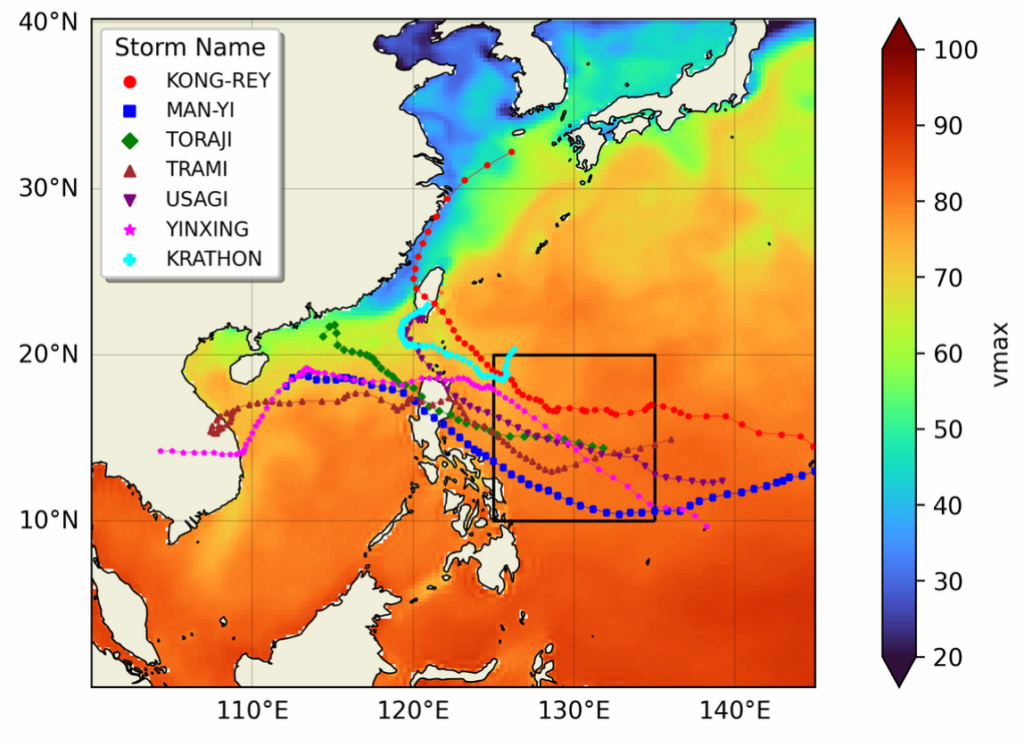
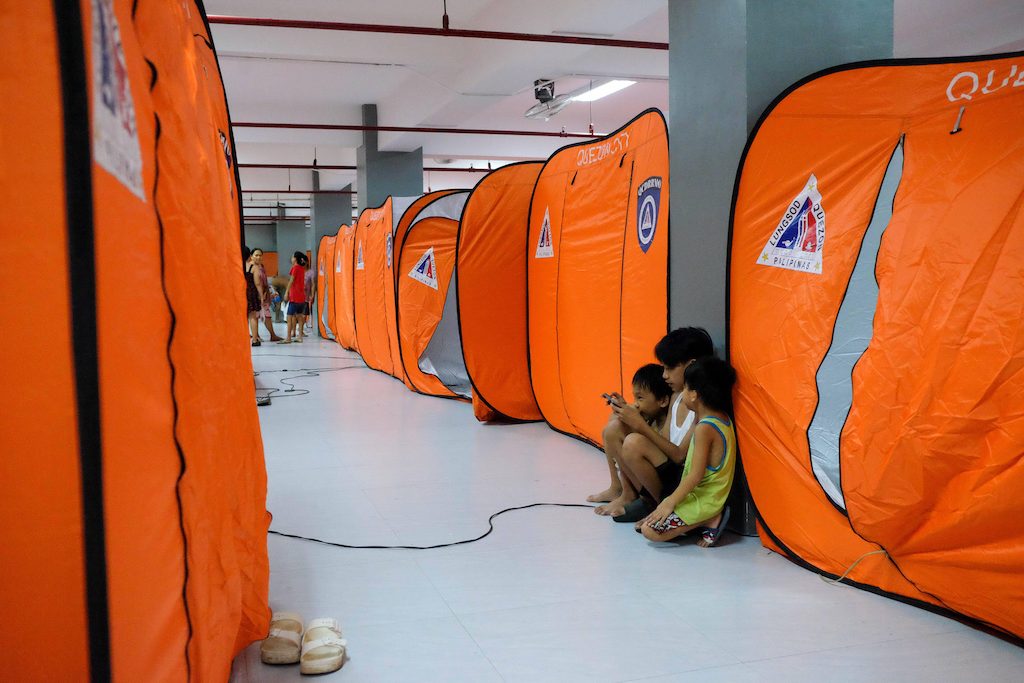



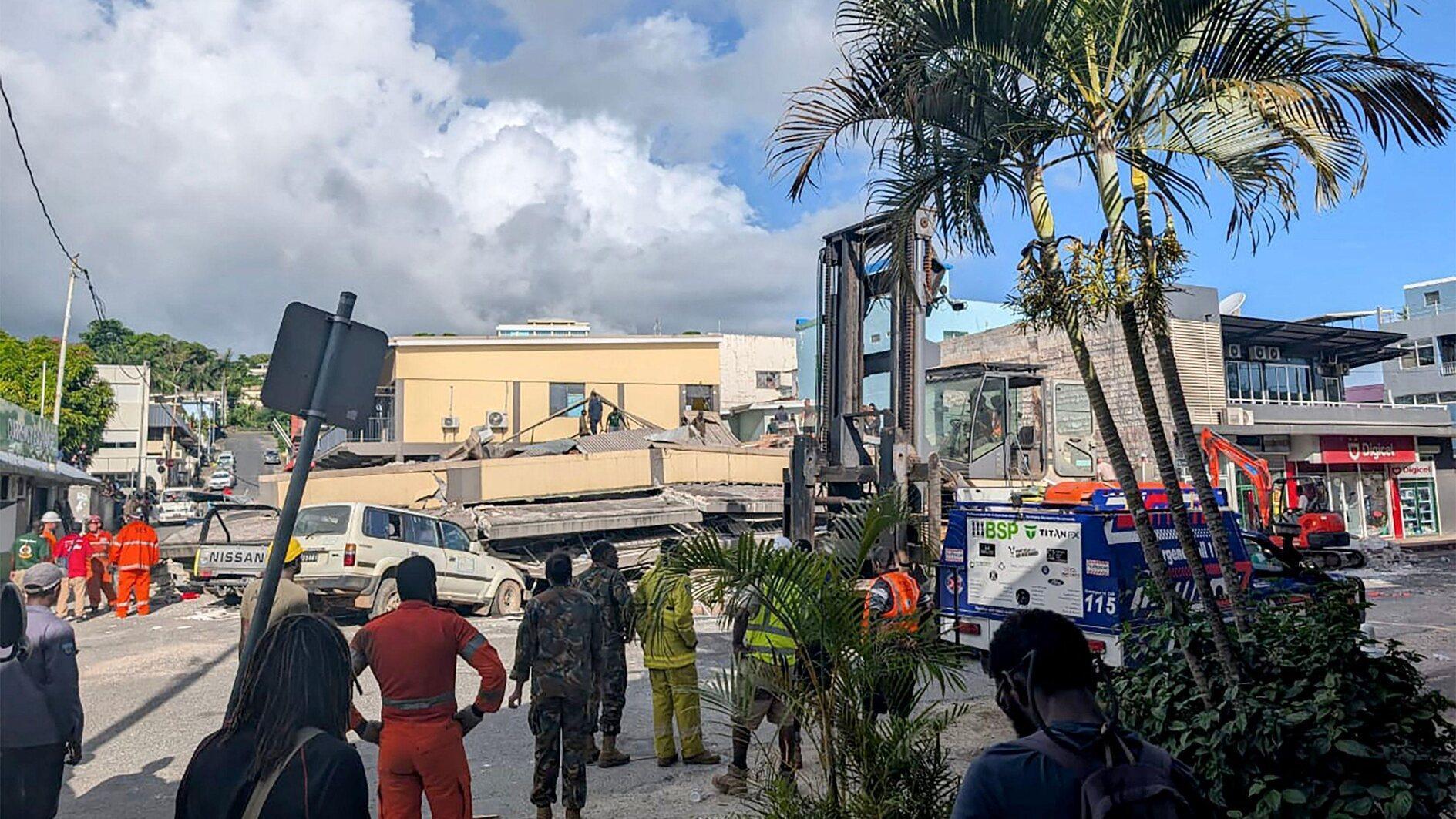
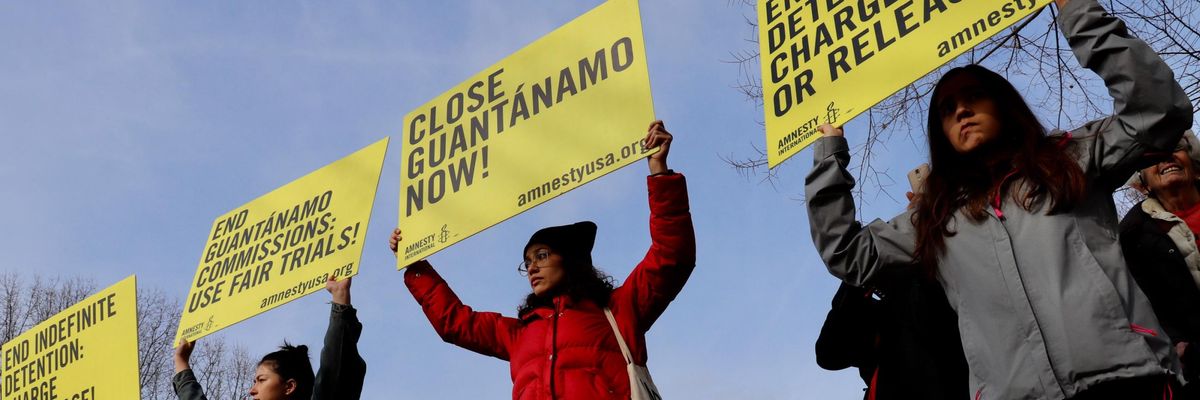


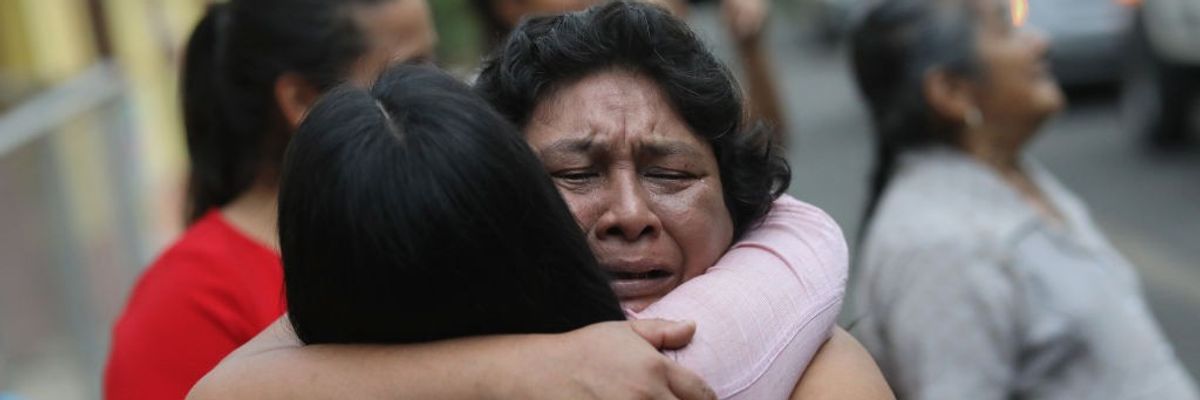



 Palestinians inspect the damage after an Israeli strike on the Nuseirat refugee camp in the central Gaza Strip on December 7, 2024.Majdi Fathi / NurPhoto via Getty Images
Palestinians inspect the damage after an Israeli strike on the Nuseirat refugee camp in the central Gaza Strip on December 7, 2024.Majdi Fathi / NurPhoto via Getty Images